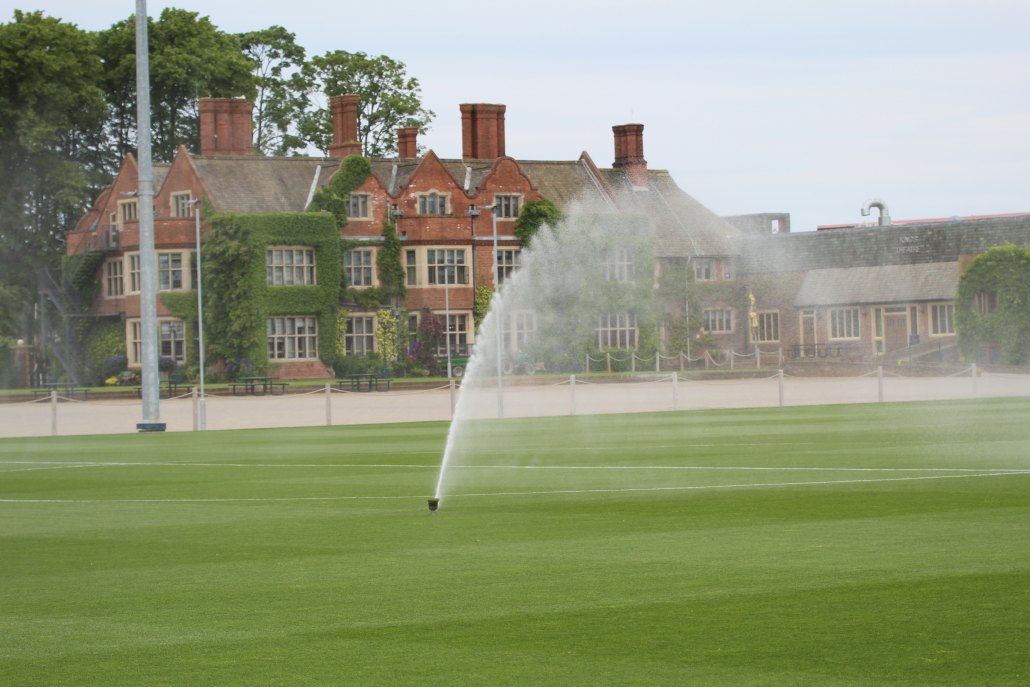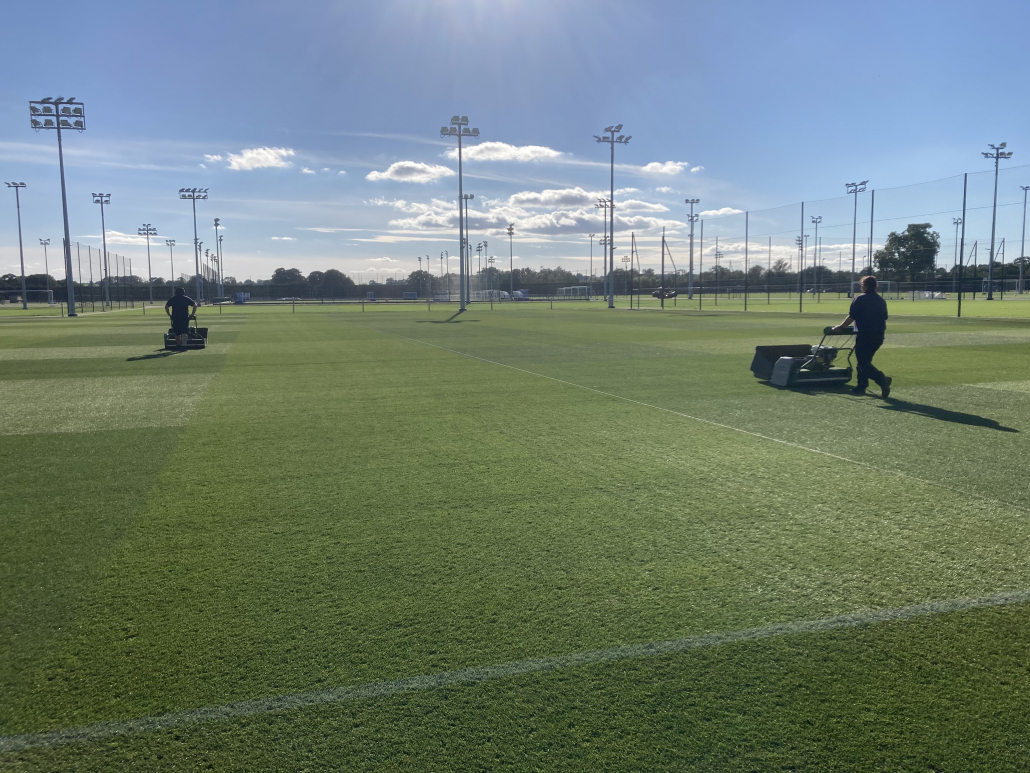The school with its own sports village: There is a school in North Yorkshire which marches to its own beat. Celebrating the individual is at the heart of its ethos, with academic results to back-up its unique approach.
Queen Ethelburga’s Collegiate, in Thorpe Underwood, half-way between York and Harrogate, is one of most prestigious schools in the country.

The school with its own sports village
In a trail blazing move in 2015 the school invested heavily in a new multi-million-pound Sports Village on the campus. Well, six years on that Sports Village is now well established, offering Queen Ethelburga’s pupils some of the finest facilities to be found anywhere and attracting top level professional teams for summer training.
The man whose role is to maintain the spectacular range of pitches and continually improve what is in place is someone whose own CV contains some of the biggest names and finest sporting venues around.
Ben Grigor was attracted by “a big advert” posted by Queen Ethelburga’s in the trade press and decided that what was on offer was an opportunity too good to miss.
“From memory it showed the pitches under construction,” recalled Ben.
“It very much looked like a job which would be a dream come true for whoever got it – to be building something from scratch ,” added the man whose CV contains the names of Rangers, at both Murray Park and Ibrox, and SIS Pitches, for which he was part of the early preparations for the Luzhniki Stadium, venue for the 2018 World Cup final, as well as other top sporting venues.
Having secured his interview, Ben’s approach during questioning was, to say the least, “high risk”.
“The CEO asked what I thought of the newly laid pitches. I’d had a walk round earlier in the day and picked up on a few things. So I said, ‘Can I be honest?’ When she agreed, I told her that actually the natural pitches needed improving.”
When constructed, the clay topsoil had been removed to install the drainage and the irrigation and then that original soil was put back on top.
“You are not going to get a high-performance pitch built on clay.
Ben’s honest assessment was taken in the spirit it was intended and the job was his. Things have not looked back since.

The school with its own sports village
“We agree a budget at the beginning of the year and we then get on with it,” said Ben, tempting fate by adding that he hadn’t had a complaint in five years.
On day one Ben arrived with no staff and no equipment, but it was building the right team which was his priority.
“Machinery is only as good as the people using it. So, I wanted a good team. I set up the rotas and procedures at a level that you would expect at a top-level training ground or stadium,” said Ben.
“I needed people who weren’t concerned when told that they weren’t going to get a day off in July, when we might have Newcastle United or England Ladies here doing double training sessions. I needed a team who were happy to be going in at 7am and finishing at 8pm and enjoying doing the work for the teams.”
“I’ve got a fantastic team now, many of them have worked at stadiums in the Premier League environment,” said Ben.
With the closure of schools as part of the Government enforced lockdown, Ben placed himself on flexible furlough during the pandemic to enable him to spend more time with his children in Glasgow, but also to make more working hours available to his guys.
“I was very conscious of their own circumstances.”
As to the machinery, there may be some manufacturers kicking themselves for not paying more attention when Ben put his requirements out to tender.
“I’d created a list of our needs and specifications. For example, what we needed from a tractor – air con, number of kilos it would need to lift, the width etc. The Toro Pro Core was the only one that had a company name attached to it.
“I put it out to all the main names in the industry but only a couple got back to me at the time. Perhaps they thought we were just a small school!”
Ben works to ensure the team is getting the best deal long-term as his purchase of a Koro proves, “We started Koroing pitches in-house, when timings suit us best.
It paid for itself very quickly when set against bringing in contractors to do the work.”
Ben has taken on board a working practice that he first experienced when a young greenkeeper at Crow Wood Golf Club, just outside Glasgow.
“The two other greenkeepers and I were given our own six holes to look after and it created great competition between the three of us. You always take pride in what is yours. So here the guys have their own pitches to look after.
If there is a limited amount of fertiliser left they will ask if they can have it for their pitches and that creates a bit of healthy argument about who gets it,” said Ben.
Having teams set up training camps during the 10 weeks of the summer break is very much part of the estates commercial offer.

The school with its own sports village
“Last summer when teams couldn’t go abroad, we hosted Newcastle United here. I think the team may have had reservations about coming to a school, but they were amazed at the quality of our facilities. So much so that they are looking to return again this year, if they are training in country again.” said Ben, who added that Leeds United also used the facilities while their own training ground was being renovated.
Queen Ethelburga’s facilities include five artificial pitches and a workout area, constructed by S&C Slatter; a five-a-bay cricket practice net facility; two multi-games areas for football, basketball and netball, a larger multi-games area for netball, tennis and basketball, a water-based hockey pitch. Every pitch is floodlit to a standard good enough for HD filming.
“We’ve also got three underwater treadmills, ice bath recovery and a sport science area. The CEO visited St George’s Park to see what was there before the project started.
Our facilities are equal to many of those in the Premiership.”
So why does Queen Ethelburga’s have such stunning sporting facilities, and what was the catalyst for investment such a vast sum of money?
Well, the school threw its hat into the ring in 2013 to be training base for one of the Rugby Union World Cup 2015 finalists only to be knocked back because the facilities weren’t up to the required standard.
“We were told that we were a lovely place but that our facilities were not up to it. All we were at the time was a traditional school playing field with no irrigation or anything else in place. They said that the accommodation and everything else required was great.” explained Ben.
While the new facilities have helped to maximise the sporting talents of some to move into the professional game, the ethos of Queen Ethelburga’s is very much to enhance the talents of their own students, right from nursery age, rather than to bring in pupils who have already been identified as having sporting potential.
One of those is certainly 17 year-old Jason Qareqare, who made a huge impact on his debut for Castleford Tigers against Hull. With his very first touch in professional rugby league, and less than a minute into the match he scored a brilliant try – a try you could say born on the playing fields of Queen Ethelburga’s.
Speaking with Ben you very much get a feeling of a man not only on top of his job but relishing the challenge of meeting the expectations of an ambitious school, prepared to invest in making itself the best it can be.
And while the career ladder for an ambitious groundsman might see a top school as a stopping off point on the way to a high-profile professional club, the job of a Head of Grounds at a top school can be very much a career pinnacle.
“Initially I think there were reservations by the school about how long I would stay, but I really I can’t see myself going anywhere else,” admitted Ben.
The improvements to the school pitches, which were the subject of Ben’s honest feedback at his interview, have been built and improved on as part of a planned phased programme.

The school with its own sports village
“We’ve been rejuvenating the surfaces. As I say they were clay-based and while they had put in sand bands it wasn’t enough, so what we’ve been doing is stripping the surfaces off and replacing them with a sand profile on the surface.
“It has meant a fair amount of time and investment, but I’m pleased to say that they trusted me.
“Once we’d done the first pitch, the benefits were clear,” said Ben, whose aim is to get every pitch to the same level across the complex.
Much of the renovation work was carried out last year, whilst the campus had to remain closed to all but key worker students, but now the aim is to have all the pitches back and available all year.
“The school is our primary focus.
We want the teachers to be happy and we want the students to be happy with the service we provide.”
While Queen Ethelburga’s might have been ahead of the pack when investing in their facilities, other schools have since followed suit.
“What we achieved, nobody else was even considering, we were ahead of our time. We’ll need to keep being dedicated to continuous improvement though, to remain at the top of our game.”
That’s Queen Ethelburga’s. Always marching to that beat of its own drum.



















